Abstract
The efficacies of bupivacaine and lidocaine together with a preoperatively administered single-dose oral combination of normal- and sustained-release preparations of diclofenac in preventing postoperative pain after third molar removal were compared in a double-blind crossover study. Bilaterally impacted lower third molars were removed in two sessions. Each patient was given one type of local anesthetic on one session and the other in the second. Pain was recorded using a visual analog scale. When the diclofenac combination (150 mg) was given before the operation, postoperative analgesia was better with bupivacaine plus diclofenac than with lidocaine plus diclofenac. Twenty-five out of 40 patients preferred bupivacaine to lidocaine for local anesthesia. It is possible to achieve effective postoperative pain prevention by combining bupivacaine and preoperative normal- and sustained-release preparations of diclofenac.
Full text
PDF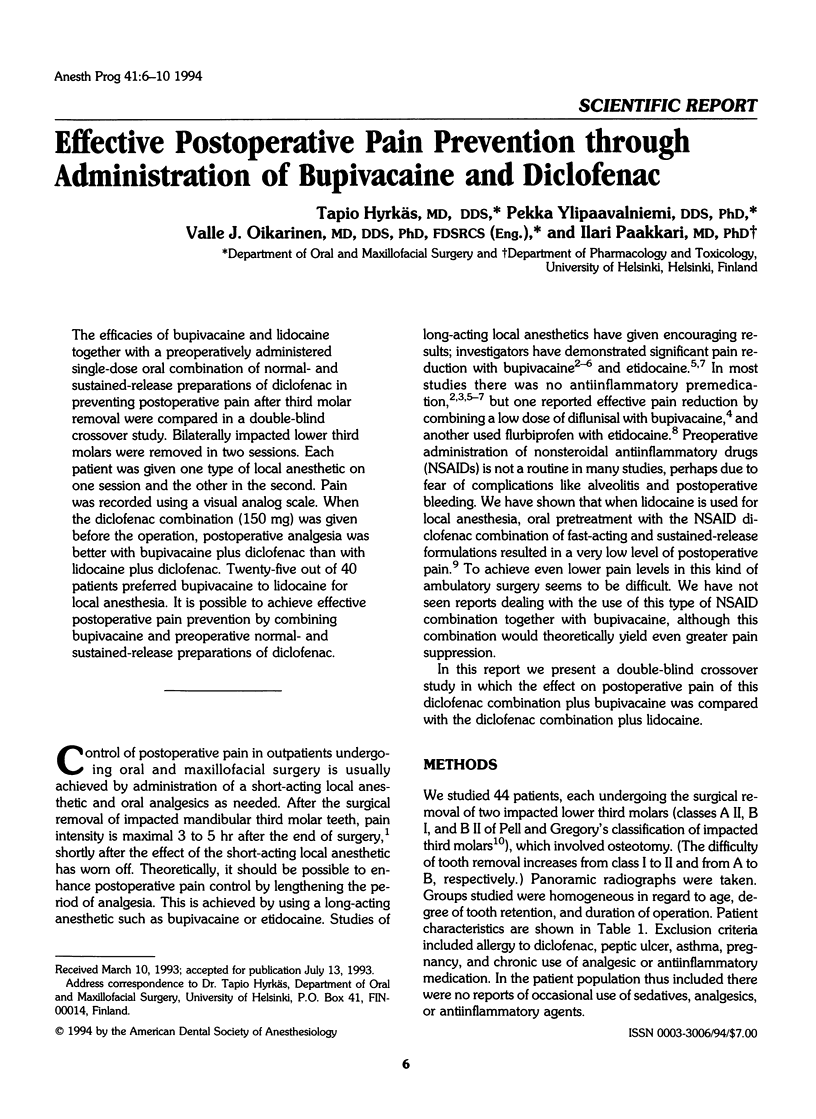
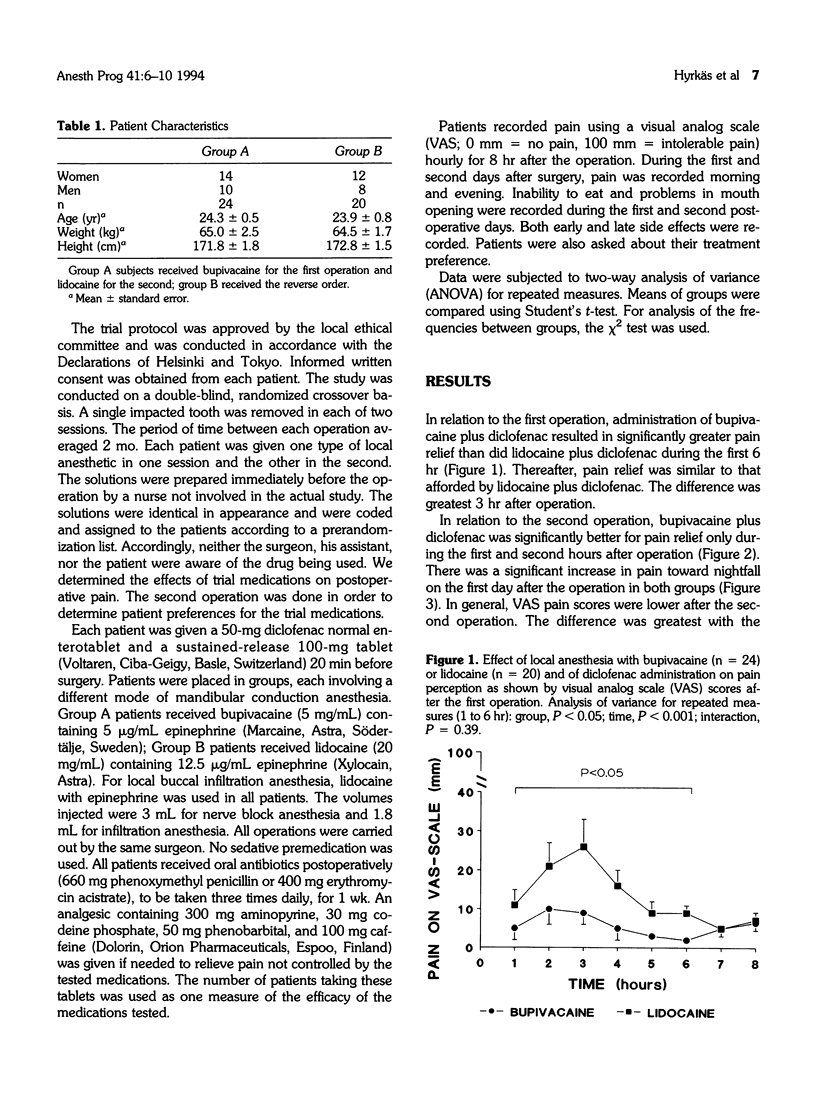
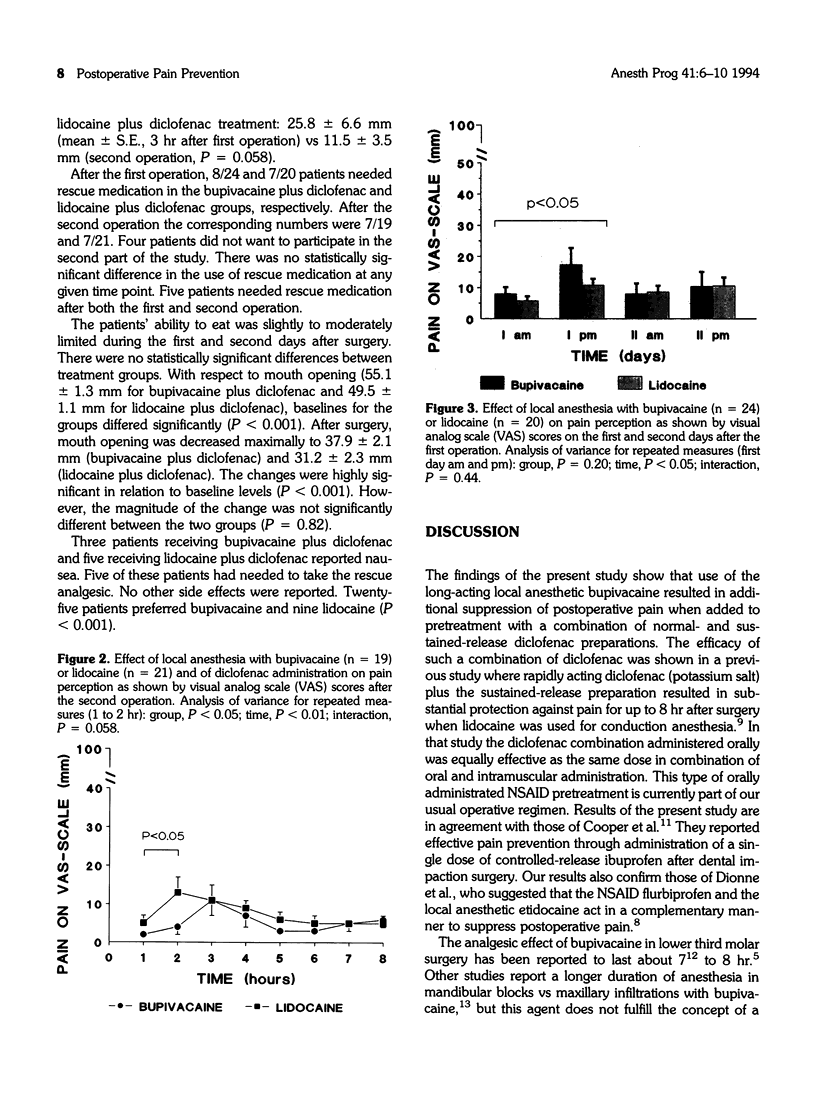
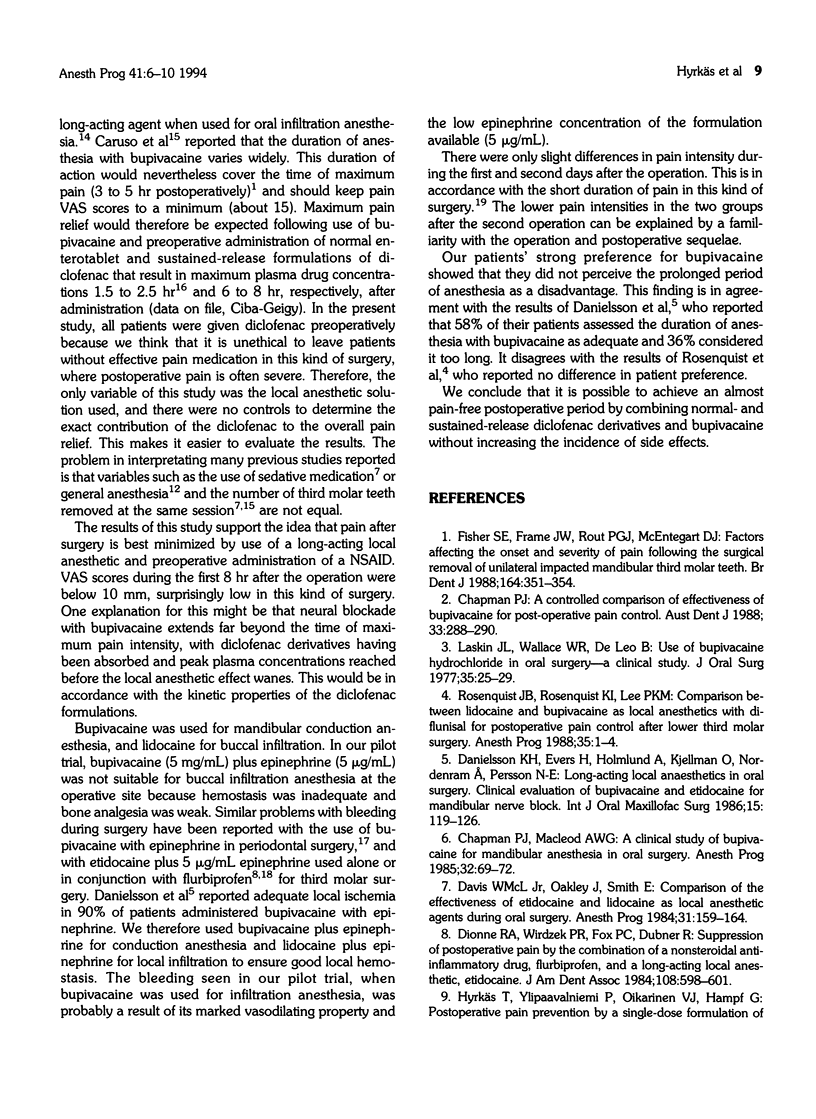
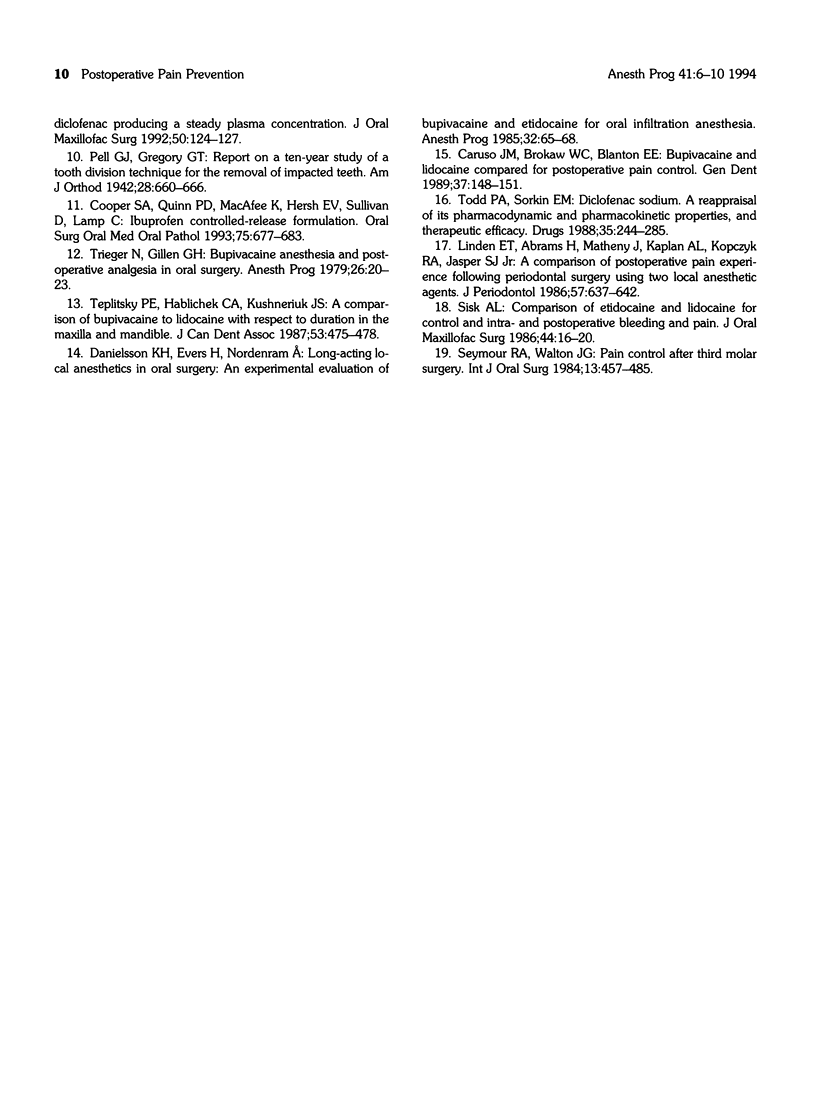
Selected References
These references are in PubMed. This may not be the complete list of references from this article.
- Caruso J. M., Brokaw W. C., Blanton E. E. Bupivacaine and lidocaine compared for postoperative pain control. Gen Dent. 1989 Mar-Apr;37(2):148–151. [PubMed] [Google Scholar]
- Chapman P. J. A controlled comparison of effectiveness of bupivacaine for post-operative pain control. Aust Dent J. 1988 Aug;33(4):288–290. doi: 10.1111/j.1834-7819.1988.tb04178.x. [DOI] [PubMed] [Google Scholar]
- Chapman P. J., Macleod A. W. A clinical study of bupivacaine for mandibular anesthesia in oral surgery. Anesth Prog. 1985 Mar-Apr;32(2):69–72. [PMC free article] [PubMed] [Google Scholar]
- Cooper S. A., Quinn P. D., MacAfee K., Hersh E. V., Sullivan D., Lamp C. Ibuprofen controlled-release formulation. A clinical trial in dental impaction pain. Oral Surg Oral Med Oral Pathol. 1993 Jun;75(6):677–683. doi: 10.1016/0030-4220(93)90421-y. [DOI] [PubMed] [Google Scholar]
- Danielsson K., Evers H., Holmlund A., Kjellman O., Nordenram A., Persson N. E. Long-acting local anaesthetics in oral surgery. Clinical evaluation of bupivacaine and etidocaine for mandibular nerve block. Int J Oral Maxillofac Surg. 1986 Apr;15(2):119–126. doi: 10.1016/s0300-9785(86)80131-4. [DOI] [PubMed] [Google Scholar]
- Danielsson K., Evers H., Nordenram A. Long-acting local anesthetics in oral surgery: an experimental evaluation of bupivacaine and etidocaine for oral infiltration anesthesia. Anesth Prog. 1985 Mar-Apr;32(2):65–68. [PMC free article] [PubMed] [Google Scholar]
- Davis W. M., Jr, Oakley J., Smith E. Comparison of the effectiveness of etidocaine and lidocaine as local anesthetic agents during oral surgery. Anesth Prog. 1984 Jul-Aug;31(4):159–164. [PMC free article] [PubMed] [Google Scholar]
- Dionne R. A., Wirdzek P. R., Fox P. C., Dubner R. Suppression of postoperative pain by the combination of a nonsteroidal anti-inflammatory drug, flurbiprofen, and a long-acting local anesthetic, etidocaine. J Am Dent Assoc. 1984 Apr;108(4):598–601. doi: 10.14219/jada.archive.1984.0385. [DOI] [PubMed] [Google Scholar]
- Fisher S. E., Frame J. W., Rout P. G., McEntegart D. J. Factors affecting the onset and severity of pain following the surgical removal of unilateral impacted mandibular third molar teeth. Br Dent J. 1988 Jun 11;164(11):351–354. doi: 10.1038/sj.bdj.4806453. [DOI] [PubMed] [Google Scholar]
- Hyrkäs T., Ylipaavalniemi P., Oikarinen V. J., Hampf G. Postoperative pain prevention by a single-dose formulation of diclofenac producing a steady plasma concentration. J Oral Maxillofac Surg. 1992 Feb;50(2):124–127. doi: 10.1016/0278-2391(92)90356-5. [DOI] [PubMed] [Google Scholar]
- Laskin J. L., Wallace W. R., DeLeo B. Use of bupivacaine hydrochloride in oral surgery-a clinical study. J Oral Surg. 1977 Jan;35(1):25–29. [PubMed] [Google Scholar]
- Linden E. T., Abrams H., Matheny J., Kaplan A. L., Kopczyk R. A., Jasper S. J., Jr A comparison of postoperative pain experience following periodontal surgery using two local anesthetic agents. J Periodontol. 1986 Oct;57(10):637–642. doi: 10.1902/jop.1986.57.10.637. [DOI] [PubMed] [Google Scholar]
- Rosenquist J. B., Rosenquist K. I., Lee P. K. Comparison between lidocaine and bupivacaine as local anesthetics with diflunisal for postoperative pain control after lower third molar surgery. Anesth Prog. 1988 Jan-Feb;35(1):1–4. [PMC free article] [PubMed] [Google Scholar]
- Seymour R. A., Walton J. G. Pain control after third molar surgery. Int J Oral Surg. 1984 Dec;13(6):457–485. doi: 10.1016/s0300-9785(84)80017-4. [DOI] [PubMed] [Google Scholar]
- Sisk A. L. Comparison of etidocaine and lidocaine for control of intra- and post-operative bleeding and pain. J Oral Maxillofac Surg. 1986 Jan;44(1):16–20. doi: 10.1016/0278-2391(86)90009-1. [DOI] [PubMed] [Google Scholar]
- Teplitsky P. E., Hablichek C. A., Kushneriuk J. S. A comparison of bupivacaine to lidocaine with respect to duration in the maxilla and mandible. J Can Dent Assoc. 1987 Jun;53(6):475–478. [PubMed] [Google Scholar]
- Todd P. A., Sorkin E. M. Diclofenac sodium. A reappraisal of its pharmacodynamic and pharmacokinetic properties, and therapeutic efficacy. Drugs. 1988 Mar;35(3):244–285. doi: 10.2165/00003495-198835030-00004. [DOI] [PubMed] [Google Scholar]
- Trieger N., Gillen G. H. Bupivacaine anesthesia and post-operative analgesia in oral surgery. Anesth Prog. 1979 Jan-Feb;26(1):20–23. [PMC free article] [PubMed] [Google Scholar]


